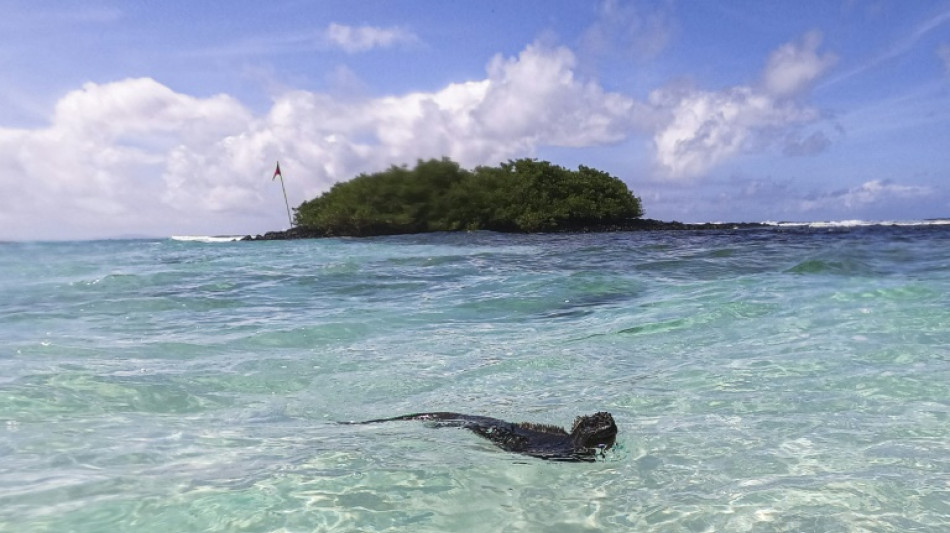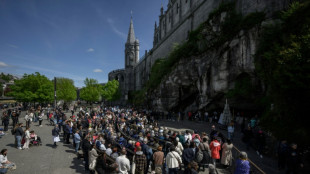
-
 Latin America fondly farewells its first pontiff
Latin America fondly farewells its first pontiff
-
'I wanted it to work': Ukrainians disappointed by Easter truce

-
 Harvard sues Trump over US federal funding cuts
Harvard sues Trump over US federal funding cuts
-
'One isn't born a saint': School nuns remember Pope Francis as a boy

-
 Battling Forest see off Spurs to boost Champions League hopes
Battling Forest see off Spurs to boost Champions League hopes
-
'I don't miss tennis' says Nadal

-
 Biles 'not so sure' about competing at Los Angeles Olympics
Biles 'not so sure' about competing at Los Angeles Olympics
-
Gang-ravaged Haiti nearing 'point of no return', UN warns

-
 US assets slump again as Trump sharpens attack on Fed chief
US assets slump again as Trump sharpens attack on Fed chief
-
Forest see off Spurs to boost Champions League hopes

-
 Trump says Pope Francis 'loved the world,' will attend funeral
Trump says Pope Francis 'loved the world,' will attend funeral
-
Oscar voters required to view all films before casting ballots

-
 Bucks' Lillard upgraded to 'questionable' for game 2 v Pacers
Bucks' Lillard upgraded to 'questionable' for game 2 v Pacers
-
Duplantis and Biles win Laureus World Sports Awards

-
 US urges curb of Google's search dominance as AI looms
US urges curb of Google's search dominance as AI looms
-
The Pope with 'two left feet' who loved the 'beautiful game'

-
 With Pope Francis death, Trump loses top moral critic
With Pope Francis death, Trump loses top moral critic
-
Mourning Americans contrast Trump approach to late Pope Francis

-
 Leeds and Burnley promoted to Premier League
Leeds and Burnley promoted to Premier League
-
Racist gunman jailed for life over US supermarket massacre

-
 Trump backs Pentagon chief despite new Signal chat scandal
Trump backs Pentagon chief despite new Signal chat scandal
-
Macron vows to step up reconstruction in cyclone-hit Mayotte

-
 Gill, Sudharsan help toppers Gujarat boss Kolkata in IPL
Gill, Sudharsan help toppers Gujarat boss Kolkata in IPL
-
Messi, San Lorenzo bid farewell to football fan Pope Francis

-
 Leeds on brink of Premier League promotion after smashing Stoke
Leeds on brink of Premier League promotion after smashing Stoke
-
In Lourdes, Catholic pilgrims mourn the 'pope of the poor'

-
 Korir wins men's Boston Marathon, Lokedi upstages Obiri
Korir wins men's Boston Marathon, Lokedi upstages Obiri
-
China's CATL launches new EV sodium battery

-
 Korir wins Boston Marathon, Lokedi upstages Obiri
Korir wins Boston Marathon, Lokedi upstages Obiri
-
Francis, a pope for the internet age

-
 Iraq's top Shiite cleric says Pope Francis sought peace
Iraq's top Shiite cleric says Pope Francis sought peace
-
Mourners flock to world's churches to grieve Pope Francis

-
 Trump says Pope Francis 'loved the world'
Trump says Pope Francis 'loved the world'
-
Sri Lanka recalls Pope Francis' compassion on Easter bombing anniversary

-
 Pope Francis inspired IOC president Bach to create refugee team
Pope Francis inspired IOC president Bach to create refugee team
-
Alexander-Arnold will be remembered for 'good things' at Liverpool: Van Dijk

-
 US VP Vance meets Indian PM Modi for tough talks on trade
US VP Vance meets Indian PM Modi for tough talks on trade
-
Pentagon chief dismisses reports he shared military info with wife

-
 15 potential successors to Pope Francis
15 potential successors to Pope Francis
-
The papabili - 15 potential successors to Pope Francis

-
 Zhao sets up all-China clash after beating 2024 world snooker finalist Jones
Zhao sets up all-China clash after beating 2024 world snooker finalist Jones
-
Ostapenko stuns Sabalenka to win Stuttgart title

-
 Argentina mourns loss of papal son
Argentina mourns loss of papal son
-
African leaders praise Pope Francis's 'legacy of compassion'

-
 Mehidy's five wickets help Bangladesh fight back in first Zimbabwe Test
Mehidy's five wickets help Bangladesh fight back in first Zimbabwe Test
-
'The voice of god': Filipinos wrestle with death of Pope Francis

-
 Prayers, disbelief in East Timor after Pope Francis death
Prayers, disbelief in East Timor after Pope Francis death
-
Real Madrid hold minute's silence as La Liga mourns Pope Francis

-
 World leaders pay tribute to Pope Francis, dead at 88
World leaders pay tribute to Pope Francis, dead at 88
-
World leaders react to the death of Pope Francis


Adapt now as hotter marine heatwaves hit: scientists
Conservationists and the fishing and tourism industries must take pre-emptive measures to protect wildlife and livelihoods as the El Nino phenomenon amplifies marine heatwaves already made more intense and frequent by climate change, scientists said on Wednesday.
The naturally occurring weather pattern originates in the Pacific Ocean and drives increased heat worldwide, bringing drought to some areas and heavy rains elsewhere.
The central and eastern Pacific, parts of the western United States, Ecuador, Peru and the Indian Ocean are most likely to be hit hardest by longer and intensified heatwaves.
Historical data show these regions to be vulnerable to mass die-offs of marine habitats including coral reefs and kelp forests, nine experts wrote in a comment in the journal Nature.
Preparing for the heatwaves in the months ahead would stave off or soften their consequences, buying precious time for species, ecosystems and connected industries to adapt, they said.
The extreme events "show us what the long-term future might be like under climate change, when these warm ocean temperatures will be experienced every day", said report co-author Alistair Hobday.
"A combination of climate warming and extreme events will make life difficult for species that are already living close to their maximum tolerance," like corals, he told AFP.
Authorities should set up warning systems so local communities can act, for instance, by relocating fish species to cooler waters, reducing harvest quotas, or closing fishing areas altogether, the scientists noted.
These can range from ocean weather forecasts reliable a week in advance to long-term climate projections that take into account manmade greenhouse gas emissions.
Improved forecasting that uses models combining ocean and atmospheric models, and assessing the accuracy of their predictions, is "crucial" for local biodiversity conservation, the experts said.
Indigenous and local communities should lead intensified monitoring and planning efforts as they are well placed to notice early changes in the environment, they added.
- 'Permanent heatwave state' -
Marine heatwaves disrupt ecosystems, killing some species and forcing others to migrate to cooler waters.
The climate crisis could create a "permanent heatwave state", meaning species and ecosystems can no longer survive in some regions, the authors wrote.
Catches can be reduced for several years, as happened in the crab and scallop fisheries off western Australia after a 2011 warming event.
Species migration can also affect fish market prices, employment and quota management.
Snorkelling and diving firms could reduce staff numbers during marine heatwaves or change their activities to minimise job losses, the researchers suggested.
Adapting to climate change has taken on a greater role in public policy in addition to mitigating its effects.
At climate negotiations in Egypt last year, UN chief Antonio Guterres unveiled a five-year plan costing $3.1 billion to build a global early warning system for deadly and costly extreme weather events amplified by climate change.
El Nino events, which occur every two to seven years, are marked by warmer-than-average sea surface temperatures in the central and eastern Pacific near the Equator, and last about nine to 12 months.
This year has already seen unprecedented marine heatwaves, with record-high temperatures measured in the Mediterranean, the North Atlantic and off Florida.
The current El Nino "could be as strong" as the previous one recorded in 2015-2016 but is developing more slowly, Hobday said.
K.Brown--BTB




